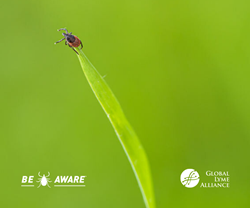
It’s becoming more important for people to establish and maintain good tick bite prevention habits every day, similar to putting on sunscreen or wearing a seatbelt.
STAMFORD, Conn. (PRWEB)
July 13, 2020
Global Lyme Alliance (GLA), the largest 501(c)(3) dedicated to conquering Lyme and other tick-borne diseases through research, education, awareness, and patient support services, conducted a brief survey of its constituents to learn their tick bite prevention awareness and habits.
Ticks are active year-round, making tick bite prevention essential. Compounding increased tick activity this year are two important factors, including: 1) initial reports show that more ticks are testing positive for Lyme disease and 2) more people are spending time outdoors after being house-bound due to the COVID-19 quarantine.
According to Mayla Hsu, Ph.D., Director of Research and Science, with GLA, “New studies are showing that more people are contracting Lyme disease close to home. You don’t have to go hiking to find ticks, they’ll find you when you’re walking the dog or at the local park.” This is an important finding as it requires a change in mindset in terms of protecting oneself against tick bites. It’s becoming more important for people to establish and maintain good Be Tick AWARE™ tick bite prevention habits every day, similar to putting on sunscreen or wearing a seatbelt.
Given the increased risk and exposure to disease-carrying ticks this year, GLA wanted to learn the tick bite prevention habits of its constituents. A brief, informal survey was sent to its database on June 9, 2020 and concluded on July 2, 2020 with 1,314 completed responses. Not surprisingly, nearly all respondents worry about getting bitten by a tick when they go outdoors. What’s encouraging, however, is that most respondents follow at least four tick bite prevention methods. When asked to check all the tick bite prevention methods they follow, the top response was daily tick checks, at 73%. When asked to identify the single prevention method they follow most regularly, the response was to avoid known tick areas, at 35%.
GLA’s Director of Education and Outreach, Sara Tyghter, who manages GLA’s Lyme Education Ambassador Program (LEAP) says, “Lyme disease prevention is the primary focus of our more than 65 trained Ambassadors who are actively raising awareness and education their communities about the signs and symptoms of Lyme disease and the importance of being tick AWARE. If GLA and our Ambassadors can help even one person prevent a tick bite and contracting Lyme disease, we have done our job.”
To see the complete results from the survey, click here.
About Lyme Disease
Lyme disease is an illness caused by the bacteria Borrelia burgdorferi, a complex microbe known as a spirochete. Lyme disease is a multi-staged, multi-systemic illness. Presentations vary by stage: acute (early stage) and chronic (late stage or persisting) illness. Everyone is a risk of contracting Lyme through the bite of an infected black-legged tick, and its estimated there are 900 new cases every day, 200 of which are children. A recent joint study by scientists at GLA and Brown University estimates the number of post-treatment Lyme disease cases could exceed two million by 2020.
About Global Lyme Alliance
Global Lyme Alliance (GLA) is the leading 501(c)(3) dedicated to conquering Lyme disease through research, education, awareness, and patient services. GLA has gained national prominence for funding the most urgent and promising research in the field, while expanding education and awareness programs for the general public and physicians. To learn more about GLA’s Be Tick AWARE tick bite prevention program, visit GLA.org.
Share article on social media or email:

